Rod Miller's Blog, page 22
May 31, 2018
Along the Old Spanish Trail.
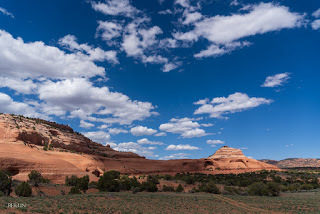
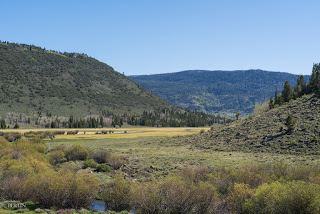
There’s a well-known saying about the Old Spanish Trail: it isn’t old, and it isn’t Spanish. But from 1829 until 1848, more or less, it was an important trade route linking Santa Fe to Los Angeles. Mexican traders (and others) loaded strings of pack mules with woolen goods in New Mexico, trailed them to California, and traded for horses and mules. The animals—many thousands of them—were trailed back to New Mexico then sold on to Missouri, Old Mexico, and other markets. Thieves also raided California ranches for horses and mules for the same purpose, as well as selling them to the U.S. Army for use in the Mexican-American war. Traders in Indian slaves used parts of the route as well.Not long ago, I had the privilege of exploring the Old Spanish Trail through Utah with the Utah Westerners. Through slickrock and sagebrush, deserts and mountains, sand and shadscale, we followed the route as nearly as possible, almost from border to border. Along the way, we were guided and educated by well-informed local historians as well as members of the Westerners.The Utah Westerners set off on such a field trip every summer, but this was my first with the group of historians and history buffs. It will not be my last.
(Thanks to Utah Westerner Steve Berlin for the photos.)
Published on May 31, 2018 12:04
May 21, 2018
My Favorite Book, Part 14.
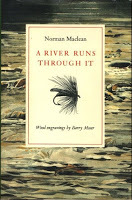
A River Runs Through It is a small book. Something over 100 pages in most editions. And it’s the only “book” Norman Maclean ever wrote. (There is a published but unfinished nonfiction book about the Mann Gulch Fire, Young Men and Fire, and a few long short stories, published with A River Runs Through It in some editions.)On the surface, A River Runs Through It is a story about fly fishing on Montana rivers. I am not interested in fly fishing. What the book is really about is love—not romantic love, but the love among a father and a mother and their two sons, with a tiny bit of romance thrown in for good measure. It contains elements of some old stories. There are hints of Cain and Abel, Isaac and Ishmael, and the story of the Prodigal Son. Unlike many books, but like many of my favorite books, there’s a lot of ambiguity in its pages. You have to pay attention. And it doesn’t end in what many readers would consider a satisfactory way. Again, there’s some ambiguity there. Maclean doesn’t provide many answers, but he does deliver a lot of questions. And that means the story stays with you long after you close the book. So much so that, like me, you’ll be inclined to open it again (and again) sometime to see what kinds of questions it asks this time.
Published on May 21, 2018 11:10
May 14, 2018
Post-game interview with a writer.

We’ve all heard athletes face the microphones after a game. What if writers had to do the same after a day at the keyboard?
Question:What have you got to say for yourself after today’s performance?
Answer:Needless to say, it wasn’t the kind of showing we hoped for. We hoped for a better result. It just didn’t happen for us this time, and that’s the way it goes sometimes. So, we have to put it behind us and move on. There will always be ups and downs in this game. As writers, we face adversity every day. We just have to step up and show what we’re made of; show some character. Establish our identity and show what kind of writers we want to be. It’s important to remember that this is a marathon, not a sprint. It’s a long season, and it’s not over until we type that last period at the end of the last page. We just have to keep at it, one letter at a time. Do our part to get the next word right, the next sentence, and not worry too much about what the next chapter might bring. We have to concentrate on the things we can control, and not dwell in the past. We have to brush off that split infinitive, forget that dangling participle, and get back out there and write. As you know, it’s a simple matter of putting in the kind of work it’s going to take if we want to control our own destiny.
Published on May 14, 2018 12:31
May 5, 2018
Higher Education.
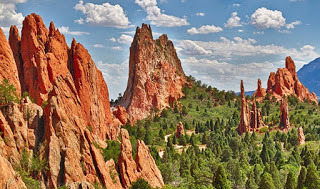
Colorado Springs, Colorado is 6,035 feet above sea level. As cities in the United State go, it’s pretty high. (No jokes about the state’s marijuana laws, please.) Being invited there to teach workshops at the Pikes Peak Writers Conference should qualify as higher education.I was there recently doing just that and enjoyed the visit and the conference.It’s a big event, with somewhere near 400 writers attending to improve their craft. There are five sessions underway at any given time, with a total of 75 workshops over the course of two-and-a-half days of the conference, not counting preliminary events and other offerings. At 6,035 feet, the air is pretty thin in Colorado Springs. But writers are thick during the Pikes Peak Writers Conference. It was good to be there and share ideas with some of them.
P.S. The photo above is Garden of the Gods, a beautiful park tucked between the city and the mountains. Well worth a visit.
Published on May 05, 2018 06:32
April 24, 2018
Coverage for a Forthcoming Book.
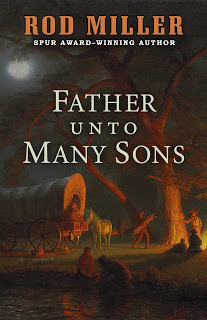
Come August, Five Star will release a new novel by yours truly: Father unto Many Sons. As you see above, the cover has been designed and is quite handsome.The book is set around about 1840 and tells the story of a father who uproots his Tennessee family to escape the evils of slavery by settling in Mexico. His wife and two of his three sons aren’t too keen on the idea, resulting in a number of difficulties. The third and youngest son supports his father and follows his lead, adding to the troubles with the other brothers. All this is made even more difficult by trials and tribulations along the trail.The book retells an older story, setting it in the American West’s challenging landscapes and violent, tumultuous times. Western Writers Hall of Fame author Lucia St. Clair Robson read the book and said, "The riveting prologue of Father Unto Many Sons makes it well-nigh impossible to resist reading to the last page of the book. Author Rod Miller has combined vivid period detail with memorable characters to create a story that gives the sensation of visiting another time and place."I can hardly wait for August and the release of Father unto Many Sons. How about you?
Published on April 24, 2018 10:19
April 16, 2018
Lies They Tell Writers, Part 44: Anyone can learn to write.

As I have preached at writers’ conferences and workshops over the years, I have crossed paths a time or two with a college writing instructor. His claim is that writing is a “skill” and that with proper instruction and practice, anyone can learn to do it.That may be true at a basic level. But I believe that getting beyond that requires some modicum of talent or aptitude or innate ability to wrangle words. The same, I contend, is true in any endeavor. For example, beyond basic arithmetic, I cannot fathom numbers. No matter how deep you dig, you’ll find no athleticism in me. I don’t understand chess. The intricacies of music escape me. I could go on.Perhaps I could improve my ability in these areas with enough training and dedication. But I do not believe there would ever come a day when I could calculate prime numbers for recreation, excel at soccer, maneuver pieces to execute a checkmate, or compose a symphony—or even a show tune. And, having read nearly incomprehensible strings of words written by people at every level of education from first grade to advanced degrees, I think the same applies to writing. For whatever reason, the ability to string sounds and words together into phrases, sentences, paragraphs and all the way up to books, in a way that makes them accessible, even enjoyable, for readers is not distributed equally among us. I, for one, am happy about that. I am happy that I may have at least a little of what might be called talent to go along with the “skill” involved in writing. I am equally happy that other people are born with the innate ability to accomplish other things, particularly the many things beyond my competency. No matter the endeavor or enterprise, the old saying, “practice makes perfect,” doesn’t always apply.
Published on April 16, 2018 08:10
April 7, 2018
Really Stupid Words, Chapter One

American English is a rich language. It’s always changing and evolving. New words and usages come and go. Many that come along are helpful. They clarify, they improve, they enhance and enrich. But some are just plain stupid. They obfuscate, they complicate, they confuse. They reveal a lack of understanding. Take “impact” for example. Impact used to be a perfectly fine word with a clear, precise meaning. The definitions in my Merriam Webster’s Collegiate Dictionary, published in 1994 (which may seem ancient to some, but it’s not thatlong ago), can be summed up as: to strike forcefully, forceful contact or collision. Pretty simple. Since then, the word has been hijacked and used in a way never meant for it: as an all-purpose substitute for affect and effect. It’s used regularly and routinely by people who cannot figure out the difference between affect and effect and when to use which and why. So, they surrender and use impact in place of either and both. “Forceful collisions” everywhere shudder at the thought.You probably heard someone abuse impact today. I wish I didn’t have to hear it anymore. It’s likely to impact my mood and have a negative impact on my state of mind.
Published on April 07, 2018 15:03
March 28, 2018
A celebration among the saguaros.

Not long ago I had the privilege of attending the Tucson Festival of Books. It’s the only event I’ve seen that attracts hundreds of thousands of people who share a love of books and reading. Display tents line the University of Arizona mall several rows deep, filled with all kinds of vendors and publishers and booksellers and others, most book-related.
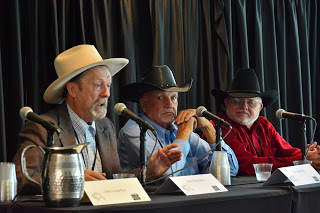
A large meeting room filled to hear a panel discussion featuring Bob Boze Bell, author, illustrator and Executive Editor of True West magazine, and author and retired rancher Alan Day. I filled the third seat at the table. Bell, a raucous raconteur, kept the audience laughing as we three exchanged stories of how our experiences growing up in the West contributed to and affected our writing.Later, I conducted a workshop on opportunities in and approaches to Western writing for a small group of aspiring authors.All in all, a worthwhile trip with lots of Arizona scenery and sightseeing stops along the way. Besides, the weather down there was a lot warmer than what we left behind and what we came home to. If you’re able, plan a visit to next year’s Festival. A full slate of lectures, panel discussions, books signings, and other presentations by authors of every type of book imaginable, including writers who are household names. If you love books, you’ll love the Tucson Festival of Books.
Published on March 28, 2018 14:42
March 22, 2018
My Favorite Book, Part 13.
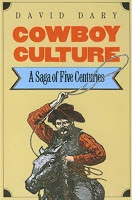
The history of my homeland, the American West, has been of interest to me for as long as I can remember. From Indians to Spanish and Mexican colonizers to explorers to mountain men to pioneer settlers to mining boom towns, I like learning about it all.But, mostly, I am intrigued by cowboys and the cattle trails and ranges and ranches where they worked. So it will be of no surprise to anyone with similar interests to know that you’ll find a well-thumbed copy of Cowboy Culture: A Saga of Five Centuries by David Dary on the bookshelf beside my desk.The book is thoroughly researched, extensive in its reach, and well written. I’ve read it through on more than one occasion. And I refer to it often when verifying facts for something I’m writing, or merely to satisfy my curiosity about some person or place or event. In fact, I just picked it up, and there are no fewer than thirteen bookmarks sticking out of it. While I cannot claim to know David Dary well, it was a pleasure, on two occasions, to share a table with him at Western Writers of America banquets. (His company was much more enjoyable than the food.) If you haven’t read Cowboy Culture, you should. You’ll soon see why it won the Wrangler Award from the National Cowboy and Western Heritage Museum, the Spur Award from Western Writers of America, and the Westerners International Award.And you’ll come away knowing about real cowboys, as opposed to the fast-riding, gun-toting “cowboys” of movie, TV, and Western novel fame who seldom, if ever, cross paths with a cow.
Post Script: I just learned from one of our readers that David Dary passed away just one week ago. That's the loss of a fine historian, writer, and man.
Published on March 22, 2018 12:19
March 13, 2018
Gads, gut hooks, and grapplin’ irons.
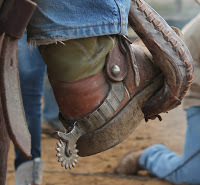
Cowboys call them by all kinds of names—gads, gut hooks, and grapplin’ irons among them. Then there’s can openers, rib wrenches, and buzzsaws. And more.But the official name—if there is such a thing in Western lingo—is spurs.Spurs are a common cowboy tool, in everyday use wherever horses are saddled. But Western Writers of America borrowed the name and attached it to something uncommon and not everyday. As the organization puts it, “Western Writers of America annually honors writers for distinguished writing about the American West with the Spur Awards.”Winners of the 2018 Spur Awards were announced recently, and I am honored to know several recipients and their work. And I am especially honored to once again be counted among them.“Lost and Found” is a short story published last year in Saddlebag Dispatches that tells of a modern-day cowboy who loses a piece of his thumb in his dallies while gathering strays on a remote range, and finds the body of a dead boy dumped in a dry wash. The judges somehow found it worthy and named it the Spur Award winner for Best Western Short Fiction.Also published in Saddlebag Dispatches , my poem “The Knowing” was named a Finalist for the Spur Award for Best Western Poem. My friend and fine poet Marleen Bussma won the Spur for her poem, “She Saddles Her Own Horse.”All thanks to the late Dusty Richards and to Casey Cowan who elected to publish the story and the poem in their magazine. And appreciation to the Spur Award judges who bestowed these honors. I am more than happy to pound a couple more nails in the wall.
Published on March 13, 2018 16:58



